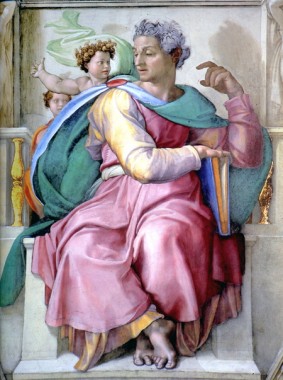THE PROPHETS
“ Which of the prophets have not your fathers persecuted? And they have slain them who foretold of the coming of the Just One; of whom you have been now the betrayers and murderers: Who have received the law by the disposition of Angels, and have not kept it.” (Acts 7:52-53)
1. There is one fact abundantly clear to, and freely recognized by, every student of Jewish history whether a friend of Christ our Lord or an enemy. It is the fact that, at His coming, the air was full of expectation of Him. Something had filled the Jewish people with the conviction that the Redeemer, the Messiah, was to come, that He would come about this time, that such and such would be His circumstances, His characteristics, the marks by which He might be known. It is stamped on the literature of the period; it is stamped still more on the first and last chapters of the life of Him who alone has claimed to have “fulfilled the expectation: That the Scripture might be fulfilled which saith,” is a constant refrain. And among the Jews today the same expectation is, as it were, petrified; disappointed at the moment, because they failed to recognize Him after all, they have readjusted their understanding of the expectation, but the expectation still remains, stamped deep on all their liturgy and creed.
 2. This expectation, and the figure of Him that was to be, was marked. He was to be born very clearly of a Virgin. He was to be born at Bethlehem; and yet by an apparent contradiction He was both to come out of Egypt and was to be called a Nazarene. He was to be of the line of David. His birth was to be both a matter of rejoicing and a source of lamentation. He was to grow up a King, and yet He was to be the humblest and the meekest of the humble and meek. He was to be the Saviour, and yet was Himself to perish. He was to perfect the Law, and yet the Law was to be ended by this new legislation. He was to give meaning to all the symbols and sacrifices, and yet was to put an end to them all. Such clear vision, surrounded by such mystery, made up the dawn of the great day.
2. This expectation, and the figure of Him that was to be, was marked. He was to be born very clearly of a Virgin. He was to be born at Bethlehem; and yet by an apparent contradiction He was both to come out of Egypt and was to be called a Nazarene. He was to be of the line of David. His birth was to be both a matter of rejoicing and a source of lamentation. He was to grow up a King, and yet He was to be the humblest and the meekest of the humble and meek. He was to be the Saviour, and yet was Himself to perish. He was to perfect the Law, and yet the Law was to be ended by this new legislation. He was to give meaning to all the symbols and sacrifices, and yet was to put an end to them all. Such clear vision, surrounded by such mystery, made up the dawn of the great day.
3. But if you were to have asked them wherever they had derived this knowledge, they could scarcely have told you. It was part of themselves, part of their nation; it had grown with them and it; the climax of the one was the climax of the other. All the past had told it to them; from the earliest tradition it had been with them as a promise; it had taken personal shape with the patriarchs, with Abraham, and Isaac, and Jacob, and Joseph; in Moses it had been fashioned as a source of national life and of religious practice; it had been symbolized in the Law, in the Temple, in the sacrifices and other rites; the heroes, men and women, in succeeding generations, had emphasized one feature or another; the prophets, each in his own day, and according to his own had added colour or a surroundings, detail to the picture; and the whole had been preserved in the sacred books as an ever-growing revelation.
Summary Meditation Points:
1. The fact of the expectation of Our Lord among the Jews at the time of His coming is accepted by all students of their history.
2. This expectation was not merely of an event, or of a person in general, but was detailed in its knowledge of what was to be.
3. This knowledge had gradually grown through the centuries, and had been preserved in the books of the Old Testament.
Editor’s Note: This is the third meditation in our Advent series from Archbishop Alban Goodier’s “The Prince of Peace” (1913).
Art: The Prophet Isaiah, Michaelangelo, Sistine Chapel, 1508-1512, PD, Restored Traditions, used with permission.




